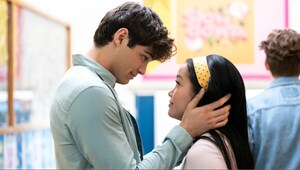Do You Haunt Your Ex Friends?
You follow their feeds, you Like their posts—but you haven’t talked to them in years. Why do we haunt the people from our past?

LET ME REASSURE YOU that I am not an Internet stalker. But I will never resist the slightly shameful urge to pore over my ex-best friend’s Instagram pictures. Everyone has a friend or an ex like this, right? Research into social networks has shown that people now maintain old connections they would have forgotten in the past. A 2012 study found that 57 percent of couples stay Facebook friends after a breakup, and many continue to interact on FB even when they you, you, you don’t IRL. Unless you’re a compulsive pruner of contacts, you carry a hive of exes and ex- friends around with you. Some call the trend ‘haunting’: a relationship that ends IRL but lives on in comments and Likes.
V* and I are a textbook example. We maintained a Thelma-and-Louise-level BFF-ship from age 12 to the third year of college. As people are known to do, we both changed a lot in school: V, in particular, fell in with a new group of liquid-eyelinered artschool girls. We talked less each year, transferring our confidences to newer friends. The last time I saw her, during an ill-fated long-weekend trip in 2010, we could barely sustain a conversation. But I still cared about her life as only a secretsharing, hairbrush-singing best friend could. And so I checked in on her Facebook every once in a while and made a compulsion of Liking all her Instagram photos. From a distance, I watched V go to grad school, move to New York, breakup with her boyfriend, and score a job at an art gallery. She Liked most of my photos too: of my boyfriend, whom she’d never met, and my new apartment, which she’d never seen.
It’s eerie to watch the life of someone you once really loved unfold on such a small screen. We’ve grown accustomed to this sort of casual surveillance of former classmates or co-workers, but the practice gets messy if you’re still plagued by... feelings. I missed my friend horribly, even after several years. I missed trading clothes, latenight chats, and the easy assumption that she’d always be there. Sometimes, after getting a notification from her, I’d feel morose—it seemed such a sad, tenuous shadow of the way we’d been before. Recently, when I got engaged, it occurred to me that under different circumstances, V would’ve been the bridesmaid at my wedding. But now, our only exchange on the subject was her Liking a photo of my engagement ring.
I think we’d be really good friends if we met today, I said to my fiancé as I scrolled through her feed, self-defeatingly wistful. Oddly, V and I ended up liking a lot of the same stuff as we grew up: gardening, yoga, dogs. Even our boyfriends shared the same name. “Stop looking. You’re letting it make you miserable,” he said. He may be right. It benefits almost no-one to maintain online ties with an estranged friend or ex, explains Tara Marshall, PhD, a research psychologist at Brunel University London and a scholar on social media and relationships. And while V and I simply drifted apart, for close friends who go through a more dramatic change, it’s important to create some emotional distance to adjust to the new reality.
“I always recommend going cold turkey for a little while,” she says. “Once the dust has settled, the negative feelings will subside, and maybe then you can have a normal Facebook friendship.” Sure enough, deep down, I knew I’d maintained this gossamer connection less out of interest in V’s life and more out of hope that we could be friends again. In late May, having finally admitted as much, I sent V a Facebook message, my first to her in half a decade. We agreed to meet for coffee at a shop of her choice close by—an artisanal-chocolate type place.
I came looking for the old V, the one who truly considered The O.C. high art—but this V referenced anarchist philosophy and palled around with a Nietzsche translator. She was smart and interesting and all-around lovely, and I wish I could tell you something profound happened over the four hours we spent drinking our (sustainable, fairtrade) coffee. In truth, the tone hit somewhere between an interview and a promising first Tinder date: we wanted to impress but lacked familiarity. I found myself saying stuff like, So, what’s new?, and realising that everything was: her career goals, her new politics, her last three breakups—I had no sense of those from her pictures.
At one point, I asked V why she’d followed my Instagram, and she said it made her happy knowing my life had turned out the way I’d wanted it to. It was a nice thought but a hollow one. You really can’t tell how someone’s life has turned out based on the photos she takes of her food. “How do you feel when you see my Insta?” she asked. ‘Sad, honestly’, I said.
After V left, I remembered something Tara had told me about exes and ex-friends. Many people maintain online ties out of morbid curiosity or schadenfreude [Oxford Dictionary describes it as pleasure derived by someone from another person’s misfortune], she said, but others struggle with letting go of someone they were once close to. I had belonged pretty firmly to the second camp, and some combination of V’s artful Instagramming and my own nostalgic self-delusion had allowed me to believe we could somehow be close again. In person, of course, V wasn’t the girl in her posts, and she wasn’t the 18-year-old I still had in my head. But it no longer seemed fair to feel sad about that. We all change, and there’s no preventing that. All we can really control is whether and how much we dwell on it.
So, sitting in that snobby coffee shop, I pulled out my phone and thumbed to V’s Instagram, crowded with pictures of art exhibits I’d never attend. It was with a sense of gratitude—liberation even—that I tapped the Unfollow button.
more from Relationships

Just calculated Taylor Swift’s net worth and now I’m crying

8 vanilla-infused beauty products for summer

#AllEyesOnB: Beauty launches on our radar this April

Your most pressing questions about Bipolar 1 Disorder, answered by people who know

What the first trip with your partner says about your relationship

Signs that you’re a bad packer on your holidays and how to avoid them

Lessons that my string of unhealthy relationships taught me

Everything you need to know about the "Who is Your Chicago?" trend

Masoom Minawala pens down a quintessential guide for every woman who wants to prove the world wrong

#AskTheTherapist: ‘Should I break ties with my toxic sister?’
